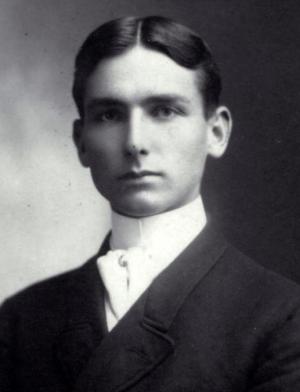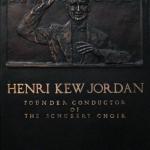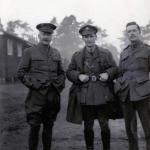BX June 8, 1938
A Well Merited Honor
The announcement of the University of Toronto that the degree of Doctor of Music will be conferred upon Mr. Henri K. Jordan of this city in recognition of the ability and genius he has displayed as conductor of the Schubert Choir will be received with enthusiasm not only by his host of friends and admirers in Brantford, but also throughout the Province of Ontario. It is a well deserved honor, and the University of Toronto does credibility to itself in bestowing this high title upon Mr. Jordan.
For a period of nearly forty years he has been connected with musical circles in Brantford, not only as a distinguished organist and choirmaster, but also as leader for more than three decades of the Schubert Choir which, in the opinion of notable music critic, is one of the outstanding choral organizations in the Dominion. The citizens of Brantford and vicinity will rejoice sincerely with the recipient in the attainment of his high honor. It is almost impossible to estimate the benefit that Mr. Jordan has conferred upon this city by his unremitting devotion to the promotion of choral singing. The inspiration which he has imparted has gone far beyond the bounds of his own choir, and the example of his splendid achievements has stimulated other organizations to noble endeavor.
Mr. Jordan will carry his new preferment with distinction, and will adorn a title that has been borne by many of Canada’s distinguished musicians. It is fitting tribute to one who has already presented thirty-two performances of the Schubert Choir to the Telephone City, and will be exceedingly popular not only among all classes of citizens, but also in the musical world which is able to appraise his work at its true value.
BX October 27, 1949
Dr. Henri K. Jordan Died Suddenly Today
Dr. Henri K. Jordan, MC, founder-conductor of the Schubert Choir, and one of Canada’s outstanding choral leaders, passed away suddenly in the Brantford General Hospital at about 1 o’clock this afternoon. He had been in hospital for a week, but appeared to be making good progress, and his death was unexpected.
Well known in industrial circles here, prominent as a church organist, and possessing a distinguished record as an officer in the First World War, Dr. Jordan was associated with various community organizations and enterprises.
His prowess in the musical field was recognized in October, 1938, when at a special convocation of the University of Toronto, the degree of Doctor of Music was conferred on him by the then chancellor, Sir William Mulock.
Dr. Jordan, a native of Toronto came to Brantford in 1902, and organized the subsequent famous Schubert Choir three years later.
A full obituary will appear in Fridays Expositor. At the time of going to press today, funeral arrangements had not yet been completed.
BX October 28, 1949 - Editorial
Henri K. Jordan
Few men have made richer contribution, in their own talented way, to the continuing well-being of this community then has Henri Kew Jordan, whose sudden passing was so regretfully recorded yesterday. His death leaves Brantford bereft of an extra ordinarily gifted and outstanding citizen.
He was a musician of superb quality, possessing a capacity of leadership that virtually infected his choristers with enthusiasm and imbued them with something of his own rare talent.
It is not necessary to recite again, in this editorial space, his many and notable achievements as pianist, organist, and conductor of various choirs and choral groups, most celebrated of which, of course, was the internationally acclaimed Schubert Choir which he founded in 1906 and directed with perennial success. In the realm of music in Canada, the names “Jordan” and “Brantford” are indelibly associated. For all that he did so well in this sphere, the people of his home community and, indeed, of this Dominion, stand enduringly in his debt. It was in fitting and deserved recognition of his work that the University of Toronto bestowed upon him, in 1938, the honorary degree of Doctor of Music.
What is said of him in the professional category can be paralleled with emphasis in the circle of all who knew him personally, and particularly among the many who had the privilege of responding to his inspired baton.
Another facet of his character was reflected in his unostentatious but intense patriotism, as exemplified not only by his distinguished service in the First World War, for which he was awarded the Military Cross, but through his everyday activities and groups with which he was connected, this not was often in sincere and convincing evidence.
Meticulous in his personal habits, he possessed an unfailing sense of the fitness of things, but, for all that, his dignity of bearing was never affected and never exclusive.
His wide reading and his regard for matters cultural were reflected not only in his personality and his musicianship but also in his love of nature, as so happily illustrated by his expert tending of his own beautiful garden.
Dr. Jordan’s devotion to his family, his church and the several societies that attracted his active participation was exemplary. The Rotary Club, if specific mention may be permitted here, benefited particularly thorough his friendship. Also, his concern with civic affairs and with the industrial progress of Brantford was always helpful.
Thus, while predominantly an exemplar of music at its best, he was, too a man of many parts with a catholicity of tastes and interests that was in itself remarkable. And his charm of manner and capacity for friendship were ever accompanied by a kindliness of heart that gained for him esteem and affection wherever he went.
So Henri Jordan will be deeply and sadly missed. Yet will he be happily remembered for what he was and what he accomplished, not less in his quietly performed deeds of kindness than in the work that was his main object in life.
BX October 31, 1949
Impressive Final Tribute is Paid to Henri K. Jordan
People from all walks of life filled Brant Avenue United Church to overflowing Saturday afternoon to pay their last respects to Dr. Henri Kew Jordan, MC, gifted musician and one of Brantford’s most respected citizens.
Following an impressive service conducted by Rev. Walter C. Almack, minister of the church, Dr. Jordan was laid to rest in beautiful Farringdon Burial Ground.
Mr. Almack conducted the graveside service and rev. H.B. Christie, long a personal friend of the deceased, pronounced the benediction, read as prayers of thanksgiving for his public life work.
Rev. A.E. Lavell, Toronto, a former minister at Brant Avenue United participated in the service in the church.
In attendance at the church and at the cemetery were many of the men and women who had been associated with Dr. Jordan in music, industry and fraternal organizations.
Special pews were reserved for former members of the Schubert Choir, which the versatile musician-business man founded and conducted and for members of the Brantford Rotary Club, an organization which he served with distinction for many years.
Out-of-town points represented at the service wee Toronto, Hamilton, London, St. Thomas, Bowmanville, Hartford, Conn., and Williamsburg, PA. A prominent out-of-town visitor was Hon. Russell T. Kelley, Ontario Minister of Health, who had been a friend of Dr. Jordan’s for many years. They met in Rotary Club work; K.C. Berney represented the Canadian Manufacturers’ Association.
Others included Dr. Cecil Currie, a former minister of Brant Avenue Church, now residing at Beamsville, and rev. Dr. Gordon Jones, London, and formerly of Brantford who served many years in China as missionary.
Fine Tribute
Mr. Almack, in paying tribute to Dr. Jordan’s great contributions to life, said that while no human being won all the virtues of life, “Dr. Jordan had won most of them.”
“He was truly a prince of the church,” the minister continued, and “his life was a picture book of his creed.”
Pointing to Dr. Jordan’s great love of his fellow men, the minister said: “He had a personal and genuine love of God and all God’s children. He was fond of the simple but important things of life – his home, garden and the scenic beauty of the countryside.”
Selections from the Holy Scriptures were read by both Mr. Almack and Mr. Lavell.
Following a prayer of thanksgiving by Mr. Lavell, the choir and congregation sang the well-known hymn, “For All the Saints Who From Their Labors Rest.”
William Findlay conducted the Brant Avenue Choir and Presided at the organ. Some members of the choir had served under Dr. Jordan when he was organist and choirmaster at the church.



